In an editorial on December 25, 1868 The New-York Times stressed that Christmas was a traditional, family time in a world of great technological change, especially the transportation revolution caused by steam power. The technological innovation led to social change:
CHRISTMAS.
It is declared on the high authority of THOMAS TUSSER, who lived and flourished three hundred odd years ago, that “Christmas comes but one a year;” which fact the philosophical TUSSER turns into a rhyme and an argument for exhorting us all, when Christmas does come, to “play and have good cheer.”
With its traditional sports and its time-honored observances; with its old, familiar frolic, its wealth of kindly feeling and memories of love and home; with its jocund ceremonies, its feasting, and reveling, and masquerading, – and with its sacred and tender historic memories, too, ever coming up to tinge the extravagance of pastime to a soberer hue – perhaps, with its undertone of private sorrow or melancholy, heard, distinct and low, amid the loudest roar of boisterous laughter, – nay, even with its traditional weather, time out of mind clear and crisp, and bracing, and cold, Christmas has come. let those of us who can, scruple not to “play and have good cheer,” – not forgetting to give “good cheer” to some that are without it.
Now, more than ever before, the family element in Christmas tops all others – for it is not merely the season of general merriment and jollity, but that of domestic gathering, a summons back to the wanderers, if may be, around the old fireside, beneath the old roof-tree. For, the family is no longer that stable and compact institution it was of old. Modern civilization has gradually undermined it, and year by year its hold upon society grows looser and looser. Steam strains and snaps the bonds of the family system; for, whereas once the labor and discomfort of travel were great, and to make one’s way across the world on foot or on hoof deterred even the restless and helped to keep him near at home, now the whole globe is open and accessible. Of old the traveled youth was a rarity, but now the home-keeping youth is the real curiosity. Of old, grandsire and son, and son’s son lived and died within the same parish precincts, and every settlement bore the names and the impress of character written upon it centuries before. Now, lands and races intermingle. The stage-coach era has gone by. Country youths habitually seek their fortunes in the city, and city youths wander across the world. With steam transportation, men go a thousand miles in search of gain or pleasure. Have you been to Alaska this Summer, to Italy this Winter, to Japan, to Jericho? – it sounds hardly stranger than it once did to ask last week’s news from Buffalo. So it turns out that the locomotive and the steamboat are revolutionizing society, and lengthening the ties which bind to the native acres, to the parental hearth.
_______________
In this changing phase of society under a civilization itself revolutionized through modern mechanical appliances, comes Christmas, hearty, cheery, old-fashioned Christmas, conservative, family-loving Christmas, to act some small part as a counterpoise, and to help bind together those whom fate and society carry apart, or who are driven asunder in the contrifugal [centrifugal ?] whirl of modern life.
It is a season, too, of brotherly kindness and charity. Never are the hearts of the charitable so free, so generous, so sympathetic, never do the poor and suffering hope so confidently for relief and with such reason for hope. It is a tight purse-string that will not loosen a little at Christmas-time; for what lessons of love and charity does not its origins teach, and what softening memories of boyhood do not spring to the minds of the most cynical of us? This delicious air of Christmas Eve and Christmas morning, just reddening the cheeks of the tardy gift-buyers, or brightening the glistening eyes of the revellers, is “a nipping and an eager air” to the destitute. The Christmas game, and beef, and wine, do not keep the generous from thought of the hungry; nor the cheery Christmas laugh of the gaily-dressed from hearing a cry from the thinly-clad and despairing. So, with its emblems and its honored customs, its evergreen and holly, its wreaths and crosses, its toys, its feasts, its gifts, its kindly wishes from mouth to mouth and heart to heart, another Christmas comes and goes, and is added to the record of our Christian era.
A few days earlier the Times encouraged its readers to exhibit charity to some destitute who were pretty much stuck in a home.
From The New-York Times December 21, 1868:
Christmas for the Maimed Soldiers.
The attention of the patriotic friends of the crippled soldiers is called to the appeal of Col. LUDWICK, in our advertising columns, for the means to provide suitable cheer for the disabled men at the “Home for Disabled Soldiers, State of New York,” on Christmas Day. Col. LUDWICK desires to give the boys a good Christmas dinner, and to decorate the institution appropriately to this festive season. We know of no class more deserving of good gifts and of hearty remembrance than the crippled survivors of our war for the Union, and predict, on the part of our citizens, liberal responses to the appeal of Col. LUDWICK and those concerned with him in the good work.
Contributions received at the places named in the appeal.
According to Historic Milwaukee VA Ephraim A. Ludwick was also maimed:
A native of Pennsylvania, Ludwick enlisted at Hanover, NY; was commissioned an officer in Company K, New York 112th Infantry Regiment on October 27, 1862; and promoted to Major on June 1, 1864. He lost his right arm in late 1864 after receiving a severe injury at Chapin’s Farm, Virginia. He was promoted to Lt. Colonel on November 26,1864, and Colonel on January 18, 1865. He mustered out on June 13, 1865 at Raleigh, North Carolina. (New York: Report of the Adjutant-GeneralThe Medical and Surgical History of the Civil War.)
The site explains that Colonel Ludwick was the chaplain of the Milwaukee National Asylum from 1870 to 1873 and details a touching baptism ceremony of little girl at the National Asylum: “The father of the little girl baptized, Sgt. Lair, and the godfather, Sgt. O’Brien, and the Chaplain, Col. Ludwick, all had given their right arms in defense of their country, while the hushed audience that filled the chapel was largely composed of war-scarred and maimed soldiers deeply interested in the consecration to God of the child of their comrade.”
Colonel Ephraim would eventually work (I think) at the Sailor’s Home in San Francisco. He died in 1887 when he was 50 and is buried in the San Francisco National Cemetery.

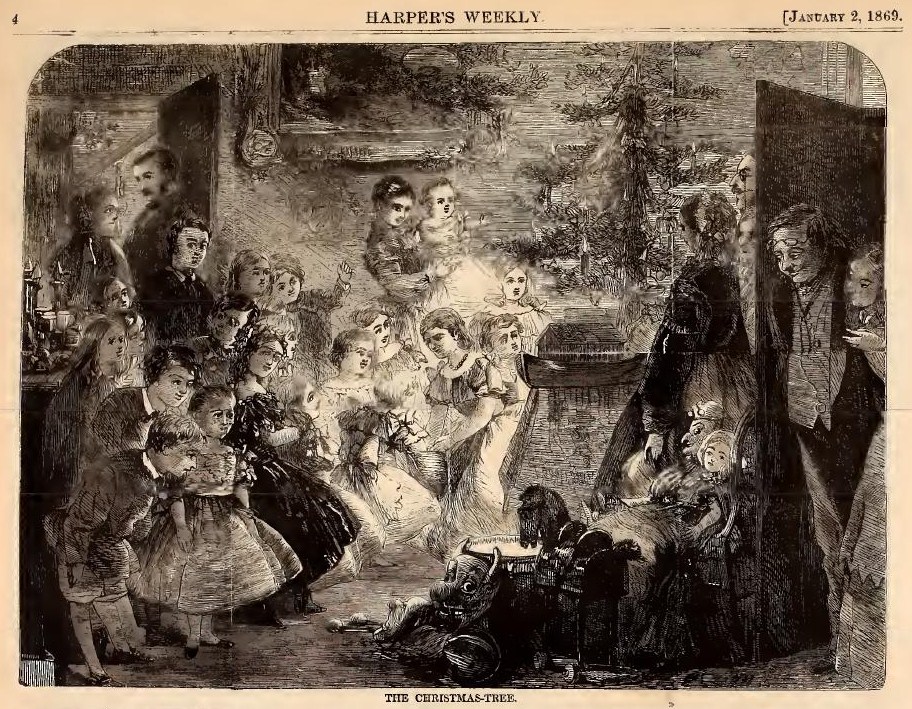
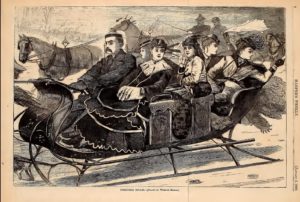
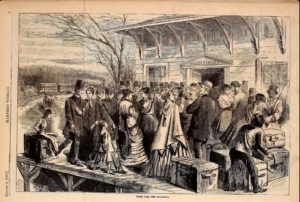
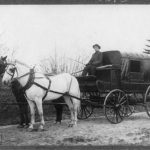
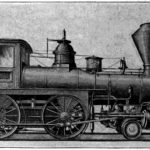
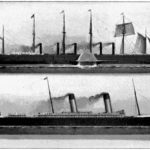
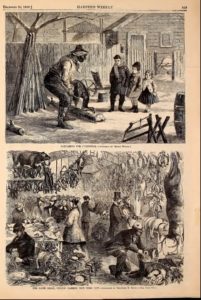
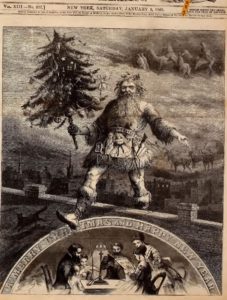
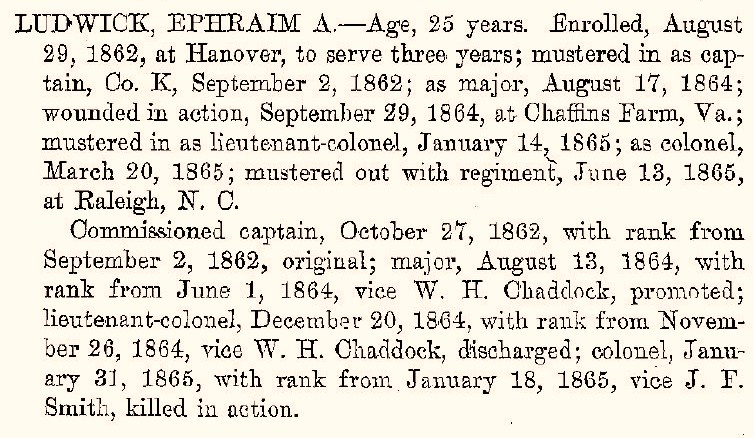
![Two unidentified Civil War veterans] / C.W. Borah, photographer, S.W. corner High & Town Streets, Columbus, Ohio (between 1880 and 1910; LOC: https://www.loc.gov/item/2017660606/)](https://www.bluegrayreview.com/wp-content/uploads/2018/12/53136v-150x150.jpg)
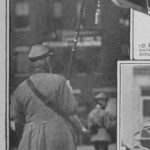
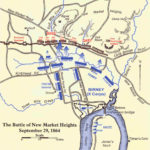
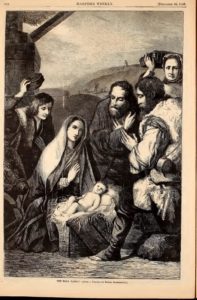
![Merry Christmas (New York : Published by Currier & Ives, 125 Nassau St., [1876])](https://www.bluegrayreview.com/wp-content/uploads/2017/12/09454v-300x238.jpg)